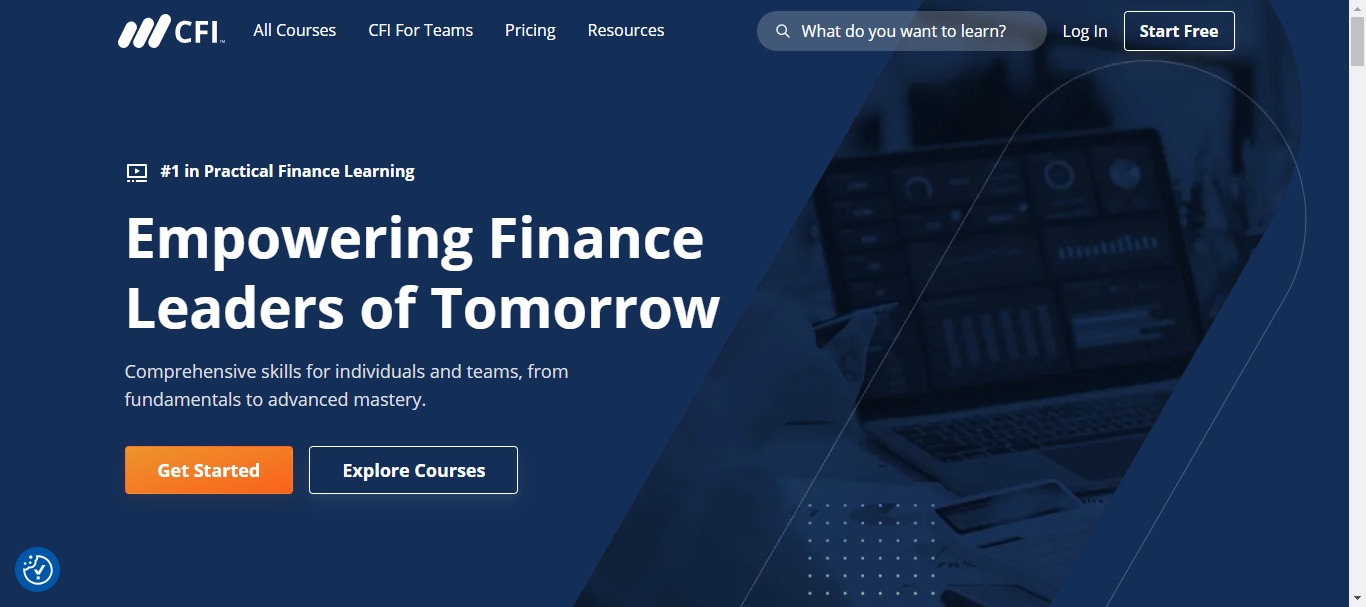Are you curious about CFI courses and certifications but feeling uncertain if they’re the right fit for you? I completely understand your hesitation—I’ve been in your shoes before. But don’t worry!
In this comprehensive Corporate Finance Institute review, we’ll examine CFI’s strengths and potential drawbacks, review its pricing, assess the effectiveness of its courses, discuss certifications, explore membership benefits, and more. I’ll also share my personal experiences with CFI.
I hope this review helps you determine whether CFI aligns with your goals.
Let’s dive in!
Is CFI Legit?
First things first. Many of us often wonder whether an online learning platform is legitimate before diving into any program. You might have the same question about CFI (because I certainly did 😂).
Is the Corporate Finance Institute legitimate? Let me explain.
CFI was established in 2016 by Tim Vipond, Scott Powell, and Lisa Dorian. Currently, Tim Vipond serves as the chairperson, and Scott Powell is the Chief Content Officer at CFI.

While both co-founders remain with the organization, Lisa Dorian bid farewell to CFI in 2022. You can learn more about the team behind CFI here.
In 2021, CFI secured funding from two leading investors in the industry. During the same year, the Corporate Finance Institute celebrated a significant milestone of reaching 1 million students and also acquired Macabacus.
CFI is presently valued at over $100 million.
Over the years, CFI has established itself as a prominent provider of financial education. Their courses and certifications hold high regard within the industry. So yes, CFI is indeed a legitimate organization in the realm of finance education.
Pros and Cons of Corporate Finance Institute
Pros
- Expert-Led Learning: CFI courses are taught by seasoned professionals with extensive industry experience.
- Comprehensive Curriculum: CFI offers a comprehensive learning package that covers a wide range of finance topics.
- Real-world Relevance: The courses focus on practical skills such as building financial models and providing knowledge and tools necessary for real-world scenarios.
- High-quality Coursework: CFI delivers in-depth course content that meets the standards of the finance industry.
- Valuable Certifications: CFI certifications, especially the FMVA, hold recognition and esteem within the finance industry.
- Online Community: CFI enables interaction with instructors and fellow learners through an online platform.
Cons
- Time Commitment: Completing a certification program with CFI requires a significant time investment, typically spanning 3 to 6 months, along with considerable effort.
- Expensive Membership Fee: CFI’s membership plans come at a high cost, especially the full-immersion plan that includes personalized guidance.
- Technical Issues: Users may encounter occasional technical glitches, such as slow video loading or malfunctioning quizzes, which can disrupt the learning process.
- Missing Soft Skills: While CFI excels in technical training, it could benefit from incorporating more emphasis on soft skills like communication.
- Ongoing Subscription Requirement: Access to learning materials and exams is contingent upon maintaining an active subscription.
- Exam Retake Window: If you fail the final certification exam, you must wait for a month before retaking it.
- No Live Classes: All CFI courses are pre-recorded, necessitating self-discipline to stay on schedule and complete the coursework.
- Only Annual Billing: CFI offers no monthly subscription plans, requiring members to commit to annual billing cycles.
- No Free Trial: CFI does not provide a free trial period, limiting the ability to assess its suitability without payment.
My Journey Into CFI?
You may address me as a lifelong learner. I hold an MSc in Fintech with distinction from the University of Stirling, Scotland, United Kingdom.
Prior to my MSc, I completed an MBA (Integrated) at GNDU, where I was honored as a gold medalist. Additionally, I served as a global client and partner business manager at a Singapore-based MNC for two years.
Beyond my academic and professional endeavors, I was recognized as a finalist at the Women in Stem-Lovelace Colloquium held in 2019 at the University of Salford, UK, and participated in the Royal Bank of Scotland’s Hackathon in the same year.
Furthermore, I am an author, having contributed to various conference papers and authored a book titled “The Magic of Compounding.”
I have also written book chapters for the upcoming book on Strategy Analytics by IGI Global. To date, I have published 7 publications and received 9 awards and honors.
Exploring the Courses Provided by CFI
1. FMVA
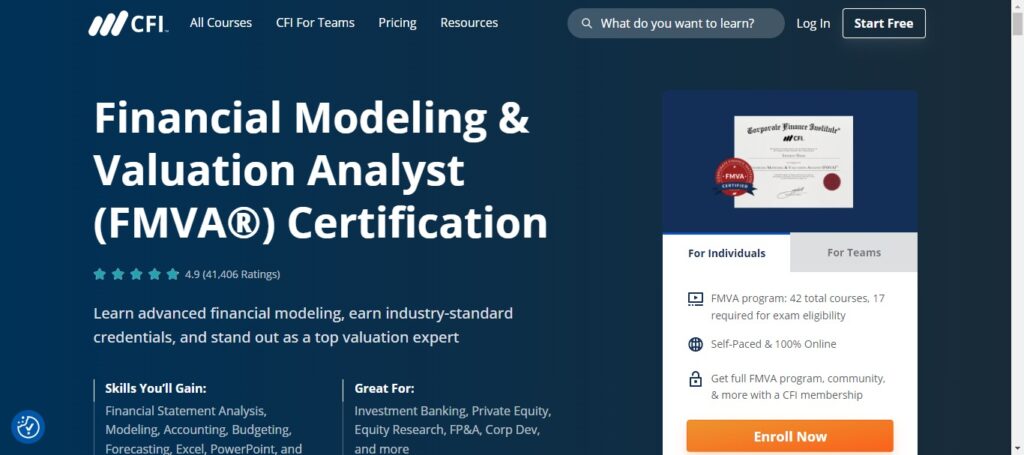
- FMVA Curriculum: Includes 7 optional Prep Courses covering corporate finance introduction, Capital IQ fundamentals, accounting basics, Excel Crash Course, Macabus Essentials, financial statement analysis, and corporate finance mathematics. Followed by 11 Core Courses focusing on financial modeling and valuation, covering accounting principles, Excel proficiency, and scenario analysis.
- Final Exam: Take the FMVA® final exam after completing the required courses, aiming for a minimum passing score of 70%.
- Opportunities After FMVA: Pursue roles such as equity research analyst, investment banker, financial planner, private equity expert, and corporate development professional.
2. CBCA
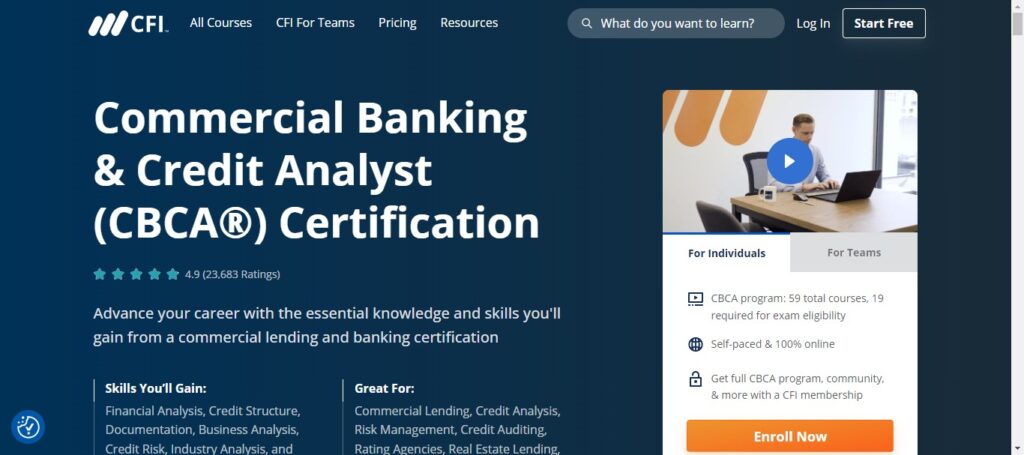
- CBCA Curriculum: Offers 7 optional Prep Courses on banking, credit, accounting basics, banking products, business structures, IBIS world fundamentals, and commercial banking careers. Followed by ‘Core Courses’ to develop a strong foundation in loan underwriting and credit analysis, covering credit fundamentals, financial modeling, and professional ethics.
- Final Exam: Complete the CBCA® final exam after finishing the required courses, aiming for a minimum passing score of 70%.
- Opportunities After CBCA: Explore opportunities as a commercial loan officer, loan broker, lender, credit analyst, risk manager, or credit adjudicator.
3. CMSA
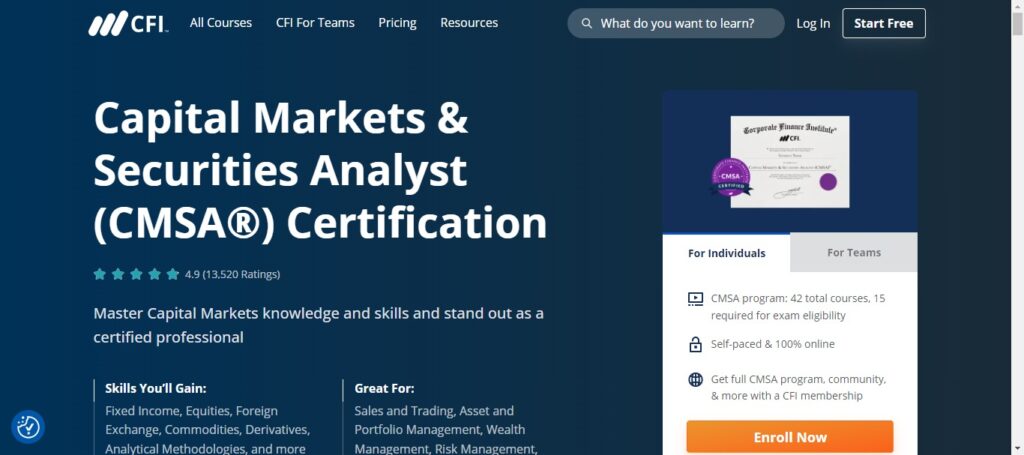
- CMSA Curriculum: Begin with 5 optional Prep Courses covering capital markets, forex basics, economics, math, and definitive fundamentals. Followed by 7 Core Courses focusing on equity, derivatives, forex, commodities, fixed-income, portfolio management, and ethics. Select 7 out of 15 Elective Courses to become certified as CMSA®.
- Final Exam: Pass the CMSA® final exam, which has been mandatory since September 1, 2021.
- Opportunities After CMSA: Pursue roles such as portfolio manager, analyst, wealth manager, risk manager, or asset management manager.
4. BIDA
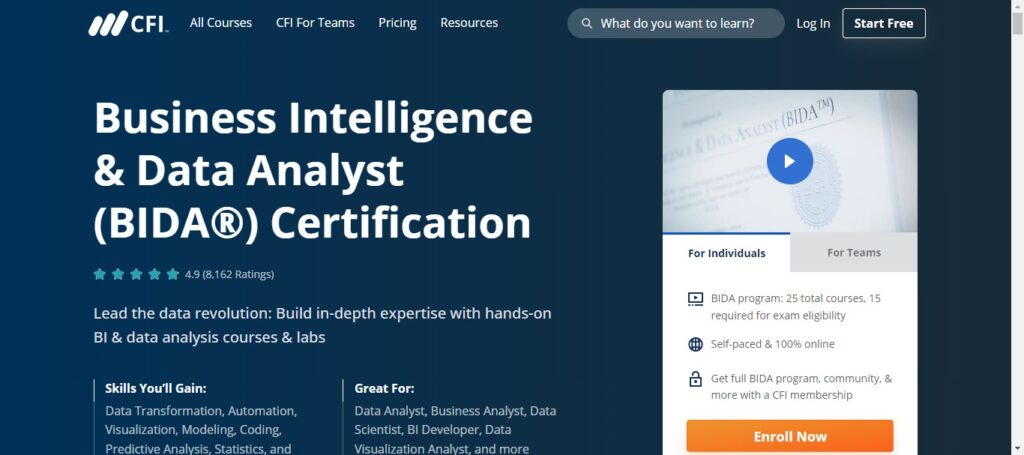
- BIDA Curriculum: Begin with 4 optional prep courses covering data science, machine learning, statistics, and Excel basics. Followed by 14 Core Courses teaching essential BI tools and methods, including Power BI, Tableau, SQL, and Python. Select 3 out of 7 Elective Courses covering advanced BI tools and Bayesian Thinking.
- Final Exam: Take the final exam after passing each course (minimum pass score of 70%) to achieve your BIDA Certificate.
- Opportunities After BIDA: Explore careers as a Business Analyst, Data Visualization Analyst, Data Scientist, Quantitative Analyst, or BI Developer.
Are CFI Certifications worth it?
CFI offers a range of finance certifications tailored to individuals at various stages of their careers, providing practical skills aligned with industry standards.
Their certifications emphasize practical skill development, setting them apart in the industry and enhancing credibility in job applications.
CFI certifications are valuable investments in finance education, offering blockchain-verified certificates upon completion.
Candidates progress through prep, core, and elective courses, culminating in a final exam with a minimum passing grade of 70%.
A physical certificate is available for an additional fee, and practice exams can be retaken, while final exams are limited to once every 30 days after failure.
Will You Get A Job With CFI Courses?
Your chances of success are high. CFI courses aim to enhance your financial skills and confidence, preparing you for real-world scenarios.
In the workplace, practical skills acquired from CFI courses will set you apart, enabling you to excel in tasks like trade execution, credit assessment, and sales forecasting.
Remember, while theoretical knowledge is crucial, practical skills are invaluable in day-to-day financial operations.
CFI Vs CFA: Which Is Better?
Allow me to clarify the distinctions between CFA and CFI briefly.
| Parameters | CFI | CFA |
| Pricing | $ 497-$847 | $3000-$4000 |
| Duration: | 100 Hours | 600 Hours |
| Best For | -Corporate Fin. Individuals -Finance Students -Bankers | -Experience Individuals -Research Roles -Advisory Roles |
| Unique Features | -Interactive Practical Modules -Get Access To All 4 Courses -Good Reviews & Feedback | -In-depth Knowledge -3 Final Exam -Structured Curriculum |
| Work Experience | Not required | 4 Years |
| Exams | Online (Anywhere, Anytime) | On-Site (Fixed Dates) |
| Pros | -Learn Practical Skills -Credible Courses Globally -Job Assistance | -Extensive Applications -Rigorous & In-depth Training -Most Relevant Certification |
| Cons | -Not Much Rigorous -Not as credible as CFA | -Expensive & Time-Consuming -Not For Beginners |
| Discounts | Regular Offers 10% Off Code – OCGRAD10 | Not any active Offers |
CFI Free Courses
While most CFI certifications and specializations require an active CFI membership, several free courses are also available.
These 20+ free courses cover fundamental topics, including accounting, Excel, corporate finance, banking, and more. Please note that these free courses only cover the basic concepts within each topic.
However, exploring these free courses provides insight into CFI’s teaching style, program structure, and overall approach. Additionally, you can obtain a course completion certificate at no charge.
CFI Pricing and Plans
Let’s explore the world of CFI Pricing and Plans. Whether you’re an individual learner or part of a team, CFI has tailored options to suit your financial learning journey.
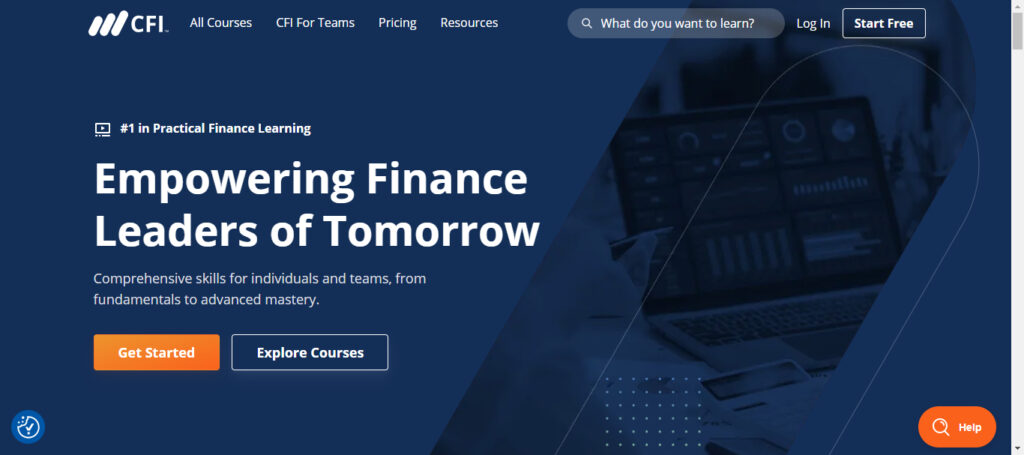
For Individuals:
1. CFI Self-Study Plan:
- Cost: Affordable yearly fee
- Ideal For: Independent learners who prefer self-paced study
- Key Features: Access to extensive resources for self-guided learning at your own pace.
2. CFI Full-Immersion Plan:
- Cost: Higher yearly fee
- Ideal For: Learners seeking additional support and guidance
- Key Features: Expert guidance, premium career resources, and enhanced support for a more immersive learning experience.
For Teams:
1. CFI Basic Plan:
- Cost: Reasonable yearly fee per team member
- Ideal For: Small teams looking to enhance their financial skills
- Key Features: Essential resources to facilitate team learning and growth.
2. CFI Premium Plan:
- Cost: Higher yearly fee per team member
- Ideal For: Larger corporate teams seeking comprehensive learning solutions
- Key Features: Additional features, personalized support, and premium resources to accelerate team learning and development.
With CFI’s diverse pricing and plan options, you can find the perfect fit for your financial education needs. Happy learning!
CFI Review: Final Thought (My Opinion)
Many wonder if completing a CFI program guarantees a job.
Let’s clear that up. While CFI provides valuable skills and resources, securing a job in finance depends on factors such as your effort and the state of the job market. Landing a job isn’t guaranteed just by having a CFI certification.
It’s crucial to set clear goals before starting a CFI program. However, CFI’s courses are respected for building a strong foundation in finance, making them valuable for both beginners and seasoned professionals.
If you prefer live classes, CFI’s online, self-paced approach may not be the right fit for you. Remember, success with CFI requires commitment and dedication.
Consider factors like your goals, schedule, and budget before investing in CFI programs. This review aims to help you make an informed decision about Corporate Finance Institute.
Frequently Asked Questions
Is CFI certification worth it?
Yes, CFI certification can be worth it, depending on your career goals and learning needs.
Is CFI genuine?
Yes, CFI is a legitimate organization offering comprehensive finance education and certification programs.
Is CFI superior to CFA?
CFI and CFA serve different purposes; CFI focuses on practical finance skills, while CFA emphasizes investment management. The choice depends on your career objectives.

